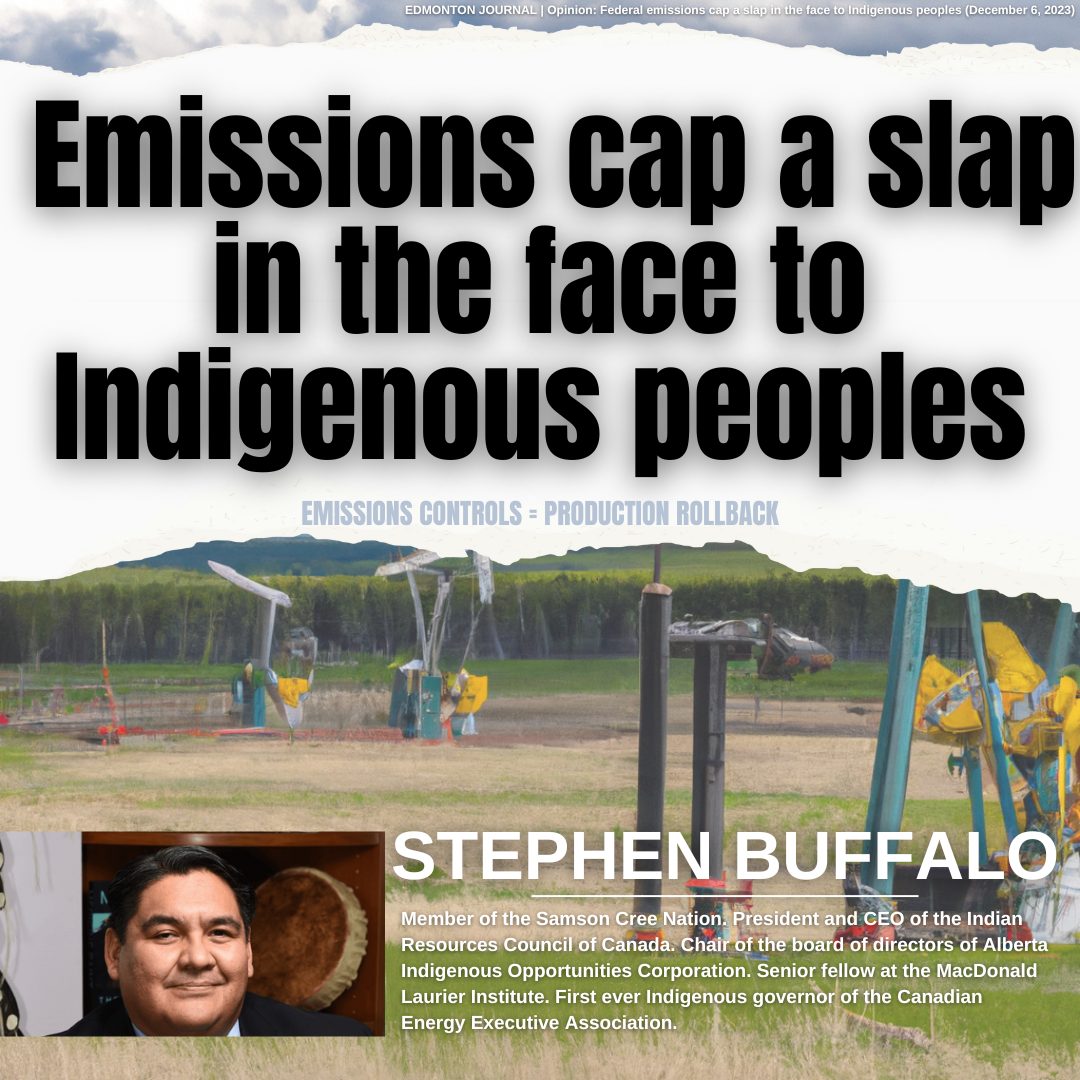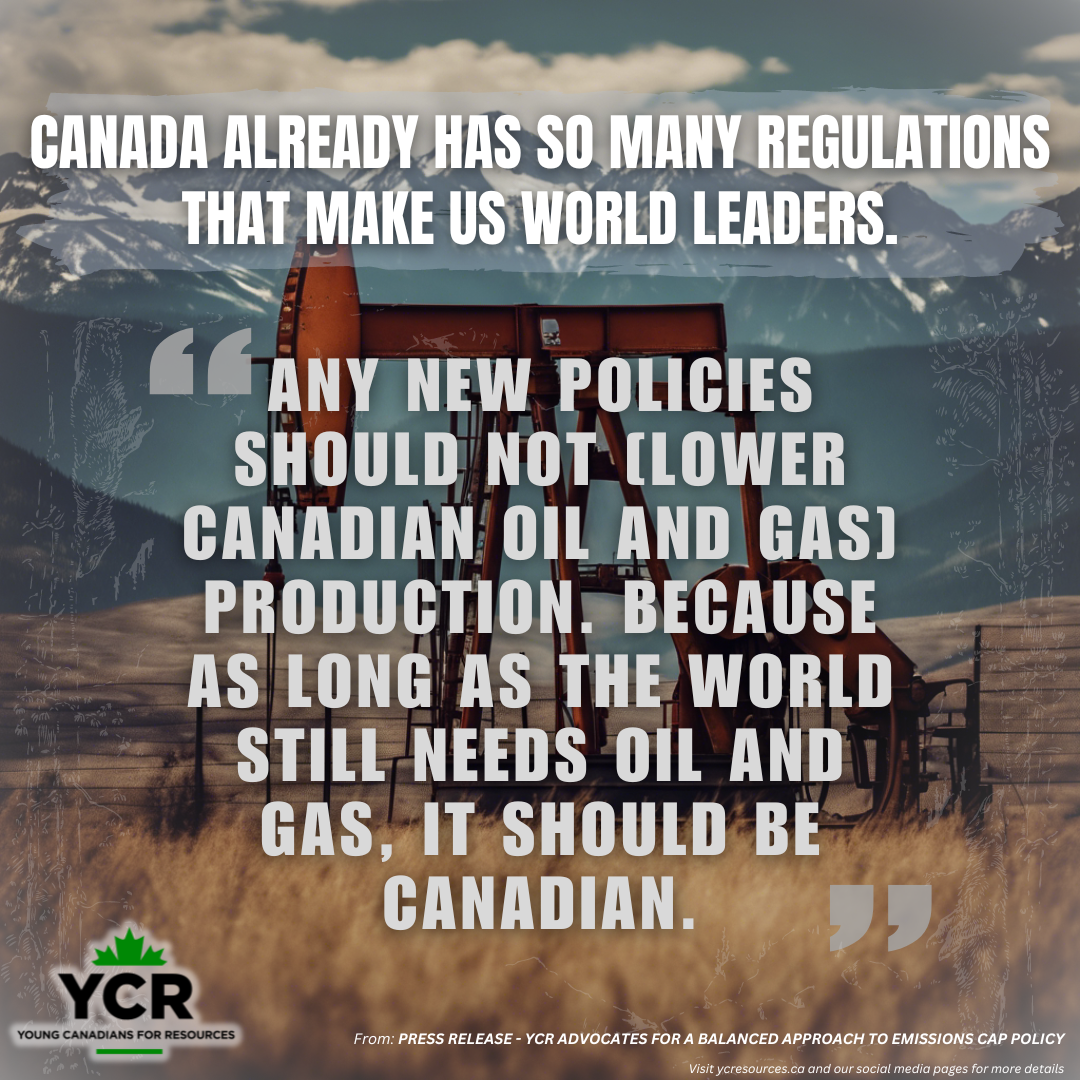YCR – December 22, 2023
Canada’s Emissions Cap: Perspectives from Industry, Policy, And Indigenous Peoples
In early December, the Federal government tabled its emissions cap framework. The framework proposes to cap emissions at 35 to 38 per cent below 2019 levels by 2030.
This decision has provoked strong reactions from many influential actors in the energy sector, governments across the country, and Indigenous Leaders. Many of these actors insist the cap is simply a production cap on Canadian oil and gas producers.
Premier of Alberta Danielle Smith criticized the federal government’s plan. On December 15, 2023, she told YCR that “the proposed federal emissions cap is a de-facto production cut and will cause massive job losses and economic damage to Alberta and Canada.”
Premier Smith added that “Alberta owns [its] resources, and under the Constitution [the province has] the exclusive jurisdiction to develop and manage them.
“We have done so responsibly by setting a price on carbon as far back as 2007, developing a carbon offset and trading program (TIER), investing billions in commercial scale carbon capture, creating an innovation fund that has so far supported 260 emissions-reducing projects with $2.6 billion in grants, and by establishing a clear framework for reaching carbon neutrality across our entire economy by 2050,” she told YCR.
“Alberta will continue implementing our Emissions Reduction and Energy Development Plan to achieve a carbon-neutral economy by 2050 through a combination of investments in emission-reducing technologies combined with practical emission offsets, all while continuing the development of Alberta’s world-class natural energy resources for Canada and the world.” Premier Smith stated.
On the investment front, Premier Smith believes that the policy will hurt investment in Canada’s energy sector, hurting countless Canadian families. She stated that the emissions cap is “risking hundreds of billions of dollars of investments in Alberta’s and Canada’s economies and core social programs, are devaluing the retirement investments of millions of Canadians, and are threatening the jobs of tens of thousands of Albertans.”
Alberta’s neighbour to the east, Saskatchewan, will also be affected by the policy.
Saskatchewan’s government was critical of the emissions cap framework, arguing that the cap does not take into account economic viability.
“The federal oil and gas emissions cap does not consider economic viability, will increase production costs, and result in production cuts,” the Saskatchewan government told YCR. “Nearly 30,000 Saskatchewan people are directly or indirectly employed by the oil and gas industry. Production cuts caused by the federal government means fewer jobs, fewer investments, and reduced economic prosperity for Saskatchewan families.”
The Saskatchewan government also touched on the fact that Canada is already home to some of the world’s strictest regulations on the oil and gas sector, and that additional harmful policies would only be a burden on our responsible domestic energy industry.
“Rather than introducing more harmful regulations, the federal government should work with the oil and gas industry, and with provinces, to support emissions reduction projects,” the province stated.
“This includes Carbon Capture, Utilization, and Storage (CCUS) for low emissions enhanced oil recovery under the federal CCUS Investment Tax Credit.”
“The oil and gas sector is a key economic driver for the province,” the province added. “We are proud of the sector and of the benefits and opportunities it creates, helping to fund hospitals, roads, and other services we use. When we experience a strong and growing economy, it helps the people of our province increase their standard of living.”
“The emissions cap threatens to reduce that prosperity.”
YCR also reached out to Sarah Rimbey from the Canadian Association of Petroleum Producers (CAPP). CAPP is a non-partisan, research-based industry association that represents some of Canada’s upstream oil and gas producers.
Rimbey echoed the Premiers’ comments, and told YCR that “this cap isn’t just an emissions cap. With Canada already operating at the ceiling of emissions reduction thanks to our high environmental and ethical standards and advanced green tech, there’s no more we can do with current technology.”
“This is a production cap,” she asserted. 
When asked whether she believes the current cap will be effective at reducing emissions while maintaining strong energy security,
Rimbey said she “do[es] not believe that the cap is an effective way to either reduce emissions, or ensure domestic energy security.”
“As oil rich as we are as a nation, we continue to import from oil regimes who have little to no respect for human rights, fund proxy wars and have low environmental standards,” Rimbey added. “With the cap, we will be snubbing our own high quality, ethically sourced product, while making these regimes rich.”
Rimbey also elaborated on how she believes the cap will affect Canadian families from coast-to-coast-to-coast.
“This will affect the cost of living in every way imaginable, with the worst being the hit that our country’s GDP will take,” Rimbey told YCR. “With oil and gas exports being one of the largest contributors to the economy, by forcing a production cut, we will be hurting every province that benefits from the revenues from our sector.”
Brian Jean, Alberta’s Minister of Energy, also commented on the issue, adding that “the emissions cap would directly impact the largest sector in Canada’s economy.”
“Canada should be the preferred supplier of natural gas and oil to the world,” Jean told YCR. “We have the lowest emissions as a major oil producer and can displace the much more emissions intensive oil and gas from other jurisdictions that have horrific environmental and human rights records.”
On the economic consequences of the policy, Jean stated that “the emissions cap will likely drive up energy costs for Canadians while preventing wage and job growth within the energy sector, the largest sector in the Canadian economy.”
Indigenous leaders have also been vocal on the issue, strongly criticizing the emissions cap.
Stephen Buffalo, member of the Samson Cree Nation, President and CEO of the Indian Resources Council of Canada, called the cap a slap to the face to Indigenous people.
“The prime minister’s talk about emissions controls is a slap in the face of Indigenous peoples,” he wrote.
If you believe that a cap on Canadian oil and gas production is a threat to domestic and global energy security, Canadian prosperity, and the livelihood of Canadian families across the nation, SIGN OUR PLEDGE.
NOTE: YCR has also reached out to other Premiers and Ministers, including Premier of British Columbia David Eby and Premier of Manitoba Wab Kinew, as well as other natural resources and energy professionals.
